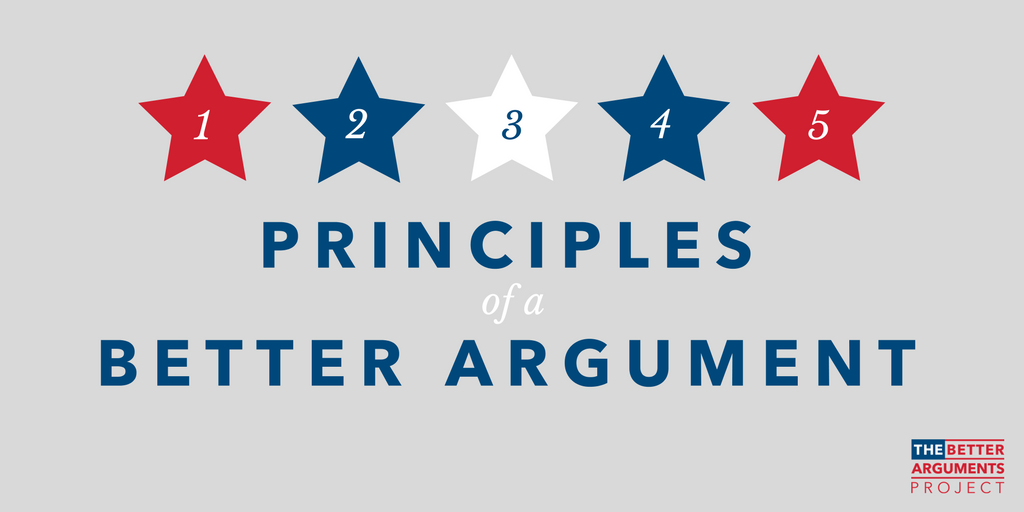In a world where arguments are often used as ammunition, here’s how to turn them into tools to solve problems.
The current divisive political climate lends itself to the perception that civility in today’s society is little more than a pipedream, that argument rules the day and factions on either side of a debate are simply shouting past each other. However a crosscurrent is at work across the country in which citizen-led efforts are attempting to bridge the divide. The efforts, though admirable, can easily go sideways and have the potential to merely compound the problem.
From this fractured dialog a concerted effort has begun to seek a better way to address the discord. Known as The Better Arguments Project, a partnership among the Aspen Institute Citizenship and American Identity Program, Facing History and Ourselves, and The Allstate Corporation, the effort sought the advice of more than 75 advisors across a wide range of ages, backgrounds, expertise, and perspective, all with the goal of defining what constitutes a better argument.
In a recent report, The Better Arguments Project team identified five tenets of better arguments, beginning with taking winning off the table:
1. No winner equals win-win
Typically people enter into an argument with the goal of winning, or at least reaching some kind of resolution. Taking this “winning” attitude off the table should be a priority for a Better Argument. “Instead, the goal should be framed as the reinstitution of civility to build a common community,” the report says. The goal is to listen and understand the other side’s opinion; no points are given for disputing another’s claim.
Understanding isn’t built on compromise; fully comprehending another’s perspective naturally leads to barriers being dismantled. Fully understanding an opinion “does not require or even suggest agreeing with that view,” according to Better Arguments Project advisor Eugene Meyer, president of the Federalist Society. No one should be encouraged to compromise their own values to embrace new ideas.
2. Active listening elevates relationships
The best argument in the world is rendered moot if no one is listening in the first place. A strong commitment to listen is crucial to a better argument. And such listening can only take place when participants truly care about each other: relationships are the key. Solid, caring relationships turn participants from adversaries to collaborators, which fosters an atmosphere in which facts become key tools to solve problems, not merely ammunition to underscore a “win.”
3. Context is the key
We are creatures of our culture. “Understanding the presence of culture in any debate increases its accessibility,” the report says. Framing a discussion in terms of the participating community’s own concerns and cultural norms make arguments more relevant to the participants, suggests former Congressman Mickey Edwards, a vice president of the Aspen Institute. Edwards offers up the example of the discussions taking place around the removal of Confederate statues. In such cases Better Argument should “begin with specific questions relevant to that community, and parties can move on to grasping the core principles from that starting point,” the report says. For example, such conversations might cover what are the values the community stands for collectively as a community? Or: how do we want to demonstrate our values as a community? the report notes.
While the role of culture is key, it is also complex. Attempts to avoid such complexity for the sake of efficiency can damage the process, warns Stephen Cornejo Garcia, director of Inclusive Diversity at Allstate. When efficiency is prioritized, thoughts and emotions may go unsaid. This is not only unproductive in the short term but destructive in the long term, leading to grudges that can increase divisions, Garcia advises.
4. Break out of the bubble
We tend to traffic in social circles that conform to our own understanding of the world. It’s a natural occurrence because entering the space of argument opens the door to vulnerability.
The fear of being vulnerable begins to evaporate the most that trust is established. Trust can be built by “establishing points of commonality among participants through exercises that humanize each other. These exercises can include the use of prompts, personal stories, and humor,” the report says.
Shared ground rules also help establish trust. When everyone is working from an agreed upon set of rules, such as a prerequisite to participation that calls for the elimination of hateful and dehumanizing language, people feel empowered to express opinions without fear of reprisal or backlash.
5. Be open to change
Engaging in a Better Argument is a transformational experience. By taking “winning” or even resolution off the table, “the goal of a Better Argument becomes to change how we engage with one another in order to build a community,” the report says. Not that such transformation is an easy process. At times it can be painful, at other times it becomes celebratory. But the pain points shouldn’t be avoided and are even necessary in some cases. Pain evokes compassion in others and may help to open hearts and minds to different views, notes Kathryn Girard, executive vice president at Skirball Cultural Center.
“Above all, Better Arguments are inspirational. Each moment of transformation can lead to another, and the Better Arguments Project aims to seed a movement in this way,” the report says.
Read the full report from The Better Arguments Project.
